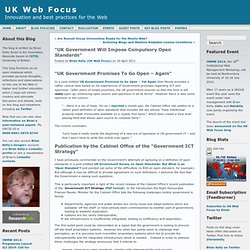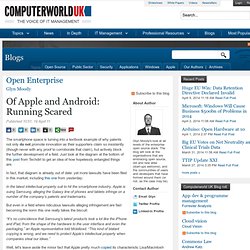

“UK Government Will Impose Compulsory Open Standards” “UK Government Promises To Go Open – Again” In a post entitled UK Government Promises to Go Open – Yet Again Glyn Moody provides a rather cynical view based on his experiences of Government promises regarding ICT and openness: “after years of empty promises, the UK government assures us that this time is will really open up, embracing open source and openness in all its forms”.

However there is also some optimism in the column: “… there is a ray of hope. For as I reported a month ago, the Cabinet Office has settled on a rather good definition of open standards that includes the key phrase “have intellectual property made irrevocably available on a royalty free basis”, which does create a truly level playing-field that allows open source to compete fairly.” The column concludes: “Let’s hope it really marks the beginning of a new era of openness in UK government IT – and that I won’t have to write this article ever again.”
Publication by the Cabinet Office of the “Government ICT Strategy” Of Apple and Android: Running Scared. The smartphone space is turning into a textbook example of why patents not only do not promote innovation as their supporters claim so insistently (though never with any proof to corroborate that claim), but actively block the further development of a field.

Just look at the diagram at the bottom of this post from Techdirt to get an idea of how hopelessly entangled things are. In fact, that diagram is already out of date: yet more lawsuits have been filed in this market, including this one from yesterday: In the latest intellectual property suit to hit the smartphone industry, Apple is suing Samsung, alleging the Galaxy line of phones and tablets infringe on a number of the company’s patents and trademarks. But even in a field where ridiculous lawsuits alleging infringement are fast becoming the norm this one really takes the biscuit: Got that? There are a couple of interesting things about this latest move by Apple. Meet The Patent Thicket: Who's Suing Who For Smartphone Patents. A few folks this week sent over a story in the Guardian by Josh Halliday and Charles Arthur with a graphic purporting to show who was suing who in the smartphone space, following the news that Microsoft had sued Motorola.

You can see that graphic here: Meanwhile, someone in our comments had pointed to a very similar graphic. The problem is that both of these graphics are wrong. The Guardian one admits that it was built off of the NY Times post from back in March that that showed a similar graphic, which we wrote about at the time. Here's that graphic: However, Joe Mullin quickly pointed out that the graphic was wrong and included a bunch of lawsuits that never happened.
Either way, with Motorola suing Apple for patent infringement, the already wrong graphic was now also out of date. Now, here's the crazy part: this is just lawsuits. Anyway, I'd say this does a damn good job demonstrating the concept of a patent thicket. True Open Standards; Open Source Next? Subscribe to this blog About Author Glyn Moody's look at all levels of the enterprise open source stack.

The blog will look at the organisations that are embracing open source, old and new alike (start-ups welcome), and the communities of users and developers that have formed around them (or not, as the case may be). Contact Author Email Glyn Twitter Profile Linked-in Profile One of the ironies of this column, which appears in a UK title, and is about the use of open source software in large enterprises, is that the biggest UK enterprise of all - the UK government - is singularly backward when it comes to using open source.
That doesn't mean it hasn't made various noises about using it over the last few years, but these have consistently amounted to nothing. When purchasing software, ICT infrastructure, ICT security and other ICT goods and services, Cabinet Office recommends that Government departments should wherever possible deploy open standards in their procurement specifications. and.